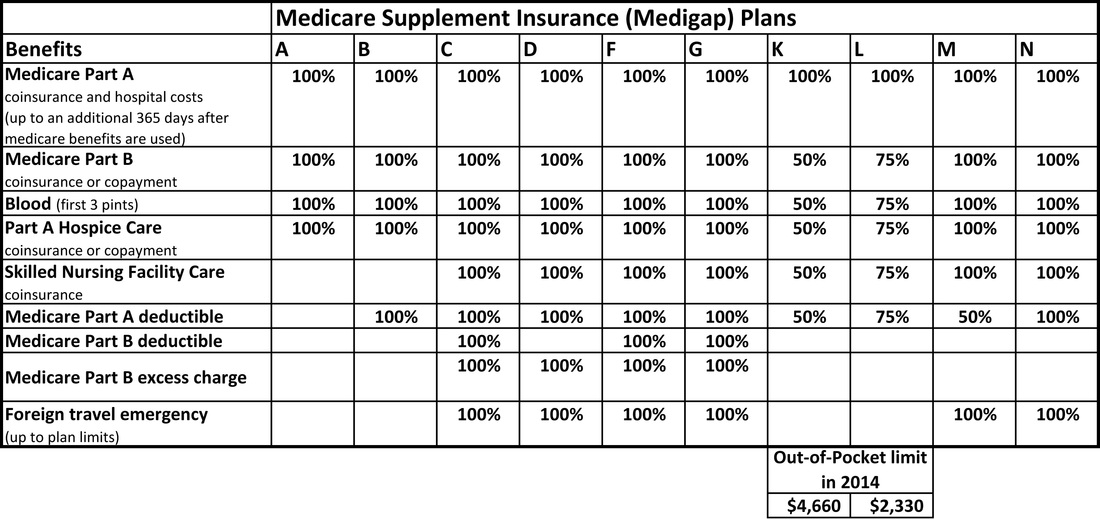What Is Medicare?
Medicare is health insurance for:
Medicare has four parts: Parts A and B – often referred to as original Medicare; Part C – Medicare Advantage; and Part D – Prescription Drug Coverage.
PART A: Inpatient Hospital Insurance
PART B: Outpatient/Physician Insurance
PART C Medicare Advantage Plans
Some private companies provide services that include Medicare Parts A and B, plus may cover some additional services such as vision, hearing, dental and certain health/wellness programs. Most Medicare Advantage plans offer prescription drug coverage.
PART D: Prescription Drug Coverage
Original Medicare doesn't generally cover prescription drugs; therefore, most people supplement with a prescription drug plan.
MEDICARE SUPPLEMENT
Medicare Supplement covers the gaps in Medicare – deductibles, coinsurance, co-pays. These amounts change each year and supplemental coverage covers those new amounts
Medicare is health insurance for:
- People age 65 or older
- People under age 65 with certain disabilities
- Eligible Individuals are under age 65 must be in the categories of disabled
or have permanent kidney failure.
Medicare has four parts: Parts A and B – often referred to as original Medicare; Part C – Medicare Advantage; and Part D – Prescription Drug Coverage.
PART A: Inpatient Hospital Insurance
- Coverage for hospital stays, skilled nursing facility, hospice care
and home health care and first 3 pints of blood.
- Eligible individuals are automatically enrolled in Part A with No
premium.
- Others apply to the program when they are eligible or pay a monthly premium
if they have worked less than 10 years in their lifetime.
PART B: Outpatient/Physician Insurance
- Coverage for doctors' services, outpatient care, preventive services,
diagnostic tests, some therapies and
medical equipment.
- There are monthly premiums. Higher income beneficiaries pay the amount plus an
additional amount, based on the income-related monthly adjustment amount
(IRMAA).
- Enrollment is optional. To obtain part B, an eligible individual must enroll 3
months prior the month of an individual’s 65th birthday, the month
of their 65th birthday and no later than 3 months after the month of
the 65th birthday.
PART C Medicare Advantage Plans
- A person can only join or switch plans during
certain times of the year
- Must cover at least what Medicare covers
- A person generally still pays a monthly Part B
premium and may also pay the Medicare Advantage plan’s premium if they charge
one
- The out of pocket costs can vary by plan as does
the extra benefits
- If the plans have certain rules, they must be followed, ex. referrals to see specialist
- Person may have to use certain providers who
belong to the plan
- Can not own a Medicare Supplement with a
Medicare Advantage plan
- The plan can decide to stop participating in
Medicare, person would then have to join another Medicare health plan or return
to Original Medicare
Some private companies provide services that include Medicare Parts A and B, plus may cover some additional services such as vision, hearing, dental and certain health/wellness programs. Most Medicare Advantage plans offer prescription drug coverage.
PART D: Prescription Drug Coverage
- Outpatient prescription drug benefit
- Operated by private companies that are subsidized by the government
- Plans may vary substantially, covering different drugs, charging their own premiums and co-pays
- To join, must have Medicare Part A and/or Part B
- Must be comparable to the “Standard Coverage”
Original Medicare doesn't generally cover prescription drugs; therefore, most people supplement with a prescription drug plan.
MEDICARE SUPPLEMENT
Medicare Supplement covers the gaps in Medicare – deductibles, coinsurance, co-pays. These amounts change each year and supplemental coverage covers those new amounts
- Medicare covers less than half of beneficiaries total costs.
- Guaranteed Renewable
- Can see any provider that accepts Medicare, no referrals needed.
